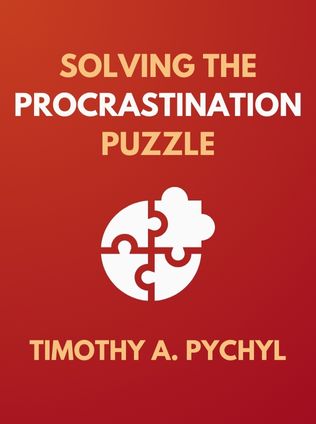
Solving the Procrastination Puzzle
A Concise Guide to Strategies for Change
By Timothy A. Pychyl
Published 10/2013
About the Author
Dr. Timothy A. Pychyl is a distinguished psychologist and professor who has spent decades studying the phenomenon of procrastination and its impact on human behavior and well-being. He served as an associate professor of psychology at Carleton University in Ottawa, Canada, where he specialized in the study of self-regulation, motivation, and emotion. His research has made significant contributions to our understanding of why people procrastinate and how this behavior can be mitigated. Dr. Pychyl is not only an academic but also a practitioner, offering practical advice for overcoming procrastination in his popular book Solving the Procrastination Puzzle. His work is known for its clarity, practicality, and grounding in scientific research, making it accessible to a broad audience. Even after his retirement in 2022, Dr. Pychyl continues to influence the field through his writings and educational series on platforms like the Waking Up meditation app.
Main Idea
Solving the Procrastination Puzzle is a guide designed to help readers understand the underlying psychological and emotional mechanisms that drive procrastination. Dr. Pychyl argues that procrastination is not just a matter of poor time management but is deeply rooted in our emotional responses and self-regulation capacities. The book emphasizes that procrastination is often a way to avoid negative emotions associated with a task, leading to a cycle of avoidance, stress, and guilt. By identifying the emotional triggers that cause procrastination and applying practical, research-backed strategies, readers can begin to break the procrastination habit and develop healthier, more productive routines.
Table of Contents
- Understanding Procrastination
- Emotions and Procrastination
- Recognizing Productive Delays
- The Consequences of Procrastination
- Why We Procrastinate
- Strategies to Overcome Procrastination
- Building Better Habits
- Final Thoughts on Procrastination
Understanding Procrastination
Dr. Pychyl begins by defining procrastination and challenging common misconceptions. He explains that procrastination is not merely a time management issue but an emotional regulation problem. When people procrastinate, they are often attempting to avoid the negative emotions associated with a particular task, such as fear, anxiety, or boredom. This avoidance provides temporary relief but ultimately leads to greater stress and a sense of failure.
As Pychyl notes,
"Procrastination is an emotion regulation problem, not a time management problem." (Pychyl)Understanding this distinction is crucial because it shifts the focus from simply trying to manage time more effectively to addressing the emotional challenges that underlie procrastination.
Pychyl's analysis reveals that procrastination is a complex behavior driven by the desire to feel good in the short term at the expense of long-term goals. When faced with a task that triggers negative emotions, individuals may choose to delay it, seeking immediate comfort rather than confronting the task head-on. This decision is often rationalized with excuses, such as "I'll feel more like doing it tomorrow," but these justifications rarely hold up.
The tendency to procrastinate is exacerbated by cognitive biases like presentism, which causes people to overvalue their current feelings and underestimate how they will feel in the future. As a result, tasks are often put off until the last minute, leading to rushed, subpar work and a cycle of guilt and stress.
- A student delays studying for an exam because they feel anxious about failing, only to cram the night before and perform poorly.
- An employee puts off starting a major project due to fear of failure, leading to a frantic rush to meet the deadline and substandard results.
Emotions and Procrastination
In this section, Pychyl delves into the emotional roots of procrastination. He explains that procrastination is often a strategy to manage negative emotions. When a task triggers feelings of anxiety, boredom, or self-doubt, individuals may procrastinate to avoid these unpleasant emotions. However, this avoidance is only a temporary solution, as the task remains undone, and the negative emotions often resurface with greater intensity as deadlines approach.
Pychyl explains,
"We procrastinate to avoid negative emotions, but in doing so, we often create more of them." (Pychyl)This avoidance can lead to a cycle of procrastination, where the relief from avoiding the task is short-lived, and the task becomes even more daunting over time.
Sign up for FREE and get access to 1,400+ books summaries.
You May Also Like
The Subtle Art of Not Giving a F*ck
A Counterintuitive Approach to Living a Good Life
By Mark MansonRich Dad Poor Dad
What the Rich Teach Their Kids About Money - That the Poor and Middle Class Do Not!
By Robert T. KiyosakiHow To Win Friends and Influence People
The All-Time Classic Manual Of People Skills
By Dale CarnegieFreakonomics
A Rogue Economist Explores the Hidden Side of Everything
By Steven D. Levitt and Stephen J. Dubner



















